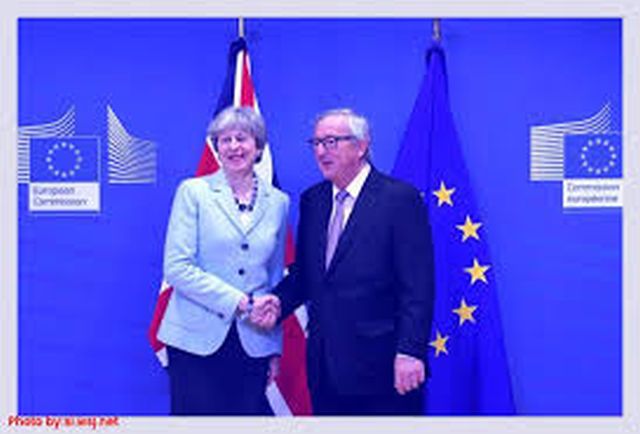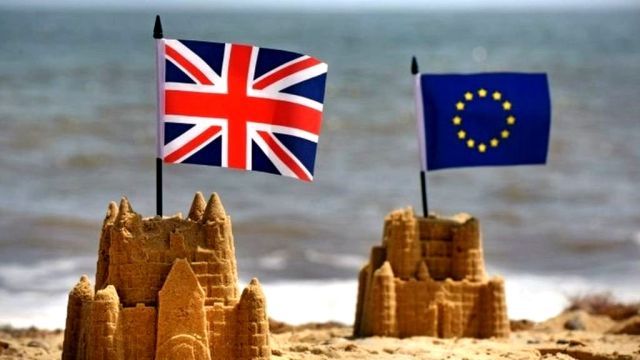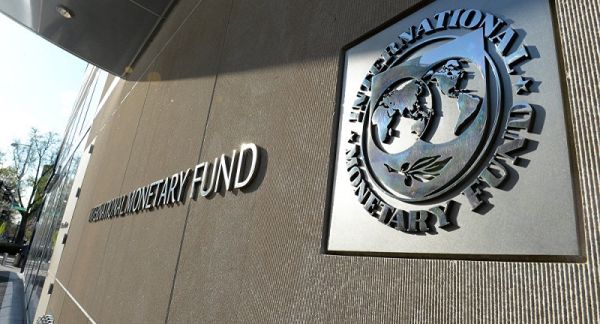
by Editor | May 25, 2021 | World
 Paris : French President Emmanuel Macron and German Chancellor Angela Merkel showed their unity on the question of Brexit during a joint press conference here.
Paris : French President Emmanuel Macron and German Chancellor Angela Merkel showed their unity on the question of Brexit during a joint press conference here.
“The withdrawal agreement cannot be renegotiated,” declared the French President to members of the press at the Elysee Presidential Palace on Wednesday, a day after British Prime Minister Theresa May’s announcement of a possible delay of the UK’s departure from the European Union (EU), currently scheduled for March 29, Xinhua news agency reported.
“If the British need more time, we can consider a request for an extension,” he added, saying, “if it is justified.”
The moment has “come for the British to make choices,” insisted Macron, assured to have the support of Merkel.
During an address to the House of Commons Tuesday, May admitted for the first time the possibility of a delay of Brexit from March 29 until the end of June.
Beyond their displayed unity on Brexit, Macron and Merkel, both under pressure in their respective countries, must deal with numerous subjects which currently divide Paris and Berlin.
The German Chancellor also underlined to the gathered journalists the necessary “compromises” to be found.
During their working lunch, the two European leaders evoked “the principle subjects on the agenda for the March European Council (European industrial policy, reinforcement of the Euro zone, the fight against disinformation), Brexit, transatlantic relations and the international situation, as well as the defence relationship between France and Germany,” said the office of the French Presidency.
An update to the Franco-German treaty of friendship and cooperation, known as the Treaty of Aix-la-Chappelle, where it was signed in January, was also on the agenda for the meeting of the two leaders.
—IANS

by Editor | May 25, 2021 | World
 Brussels : Britain’s planned exit from the European Union next month will hopefully not be “brutal” or “divisive” especially given the many Italians resident in the UK and Britons living in Italy, Italian Foreign Minister Enzo Moavero Milanesi said on Tuesday.
Brussels : Britain’s planned exit from the European Union next month will hopefully not be “brutal” or “divisive” especially given the many Italians resident in the UK and Britons living in Italy, Italian Foreign Minister Enzo Moavero Milanesi said on Tuesday.
“We hope there will be no brutal severing of the relationship between Britain and the EU, given that many Italian citizens live on the other side of the channel and there are many Britons living in Italy,” he said.
Italy has “strong economic interests” in and “a positive trade balance” with Britain, Moavero said on the sidelines of the EU General Affairs Council.
“We hope that a non-divisive way forward can be found,” he said.
“A possible extension of Britain’s withdrawal from the EU beyond March, which remains a possibility under Article 50 of the Treaty on European Union and which requires the European Council’s unanimous accord,” Moavero said.
The foreign ministry said that Moavero had talks with his British counterpart Jeremy Hunt in Brussels Monday on the rights of Italian citizens in the UK and Britons resident in Italy after Brexit, which is scheduled for March 29.
Britain’s Premier Theresa May is still hoping to secure changes to the withdrawal treaty she negotiated with the EU in order to get a revised deal through parliament. She has not ruled out a no-deal Brexit should her bid fail.
—IANS/AKI

by Editor | May 25, 2021 | Business, Corporate, Corporate finance
 By Ravi Dutta Mishra,
By Ravi Dutta Mishra,
New Delhi : Britain is set to leave the European Union on March 29 and concerns remain across the globe with the financial markets already jittery over the possibility of a no-deal Brexit. For India, experts say, Brexit might have a short-term adverse impact but benefits lie in the long run.
So far, Brexit talks between England and the EU have not been fruitful and there are concerns that Britain might have to leave the Union without a deal which may have severe economic impact including a recession in England.
“..if there is Brexit without a deal then there could be short-term disruption while in the long run, it makes the UK less dependent on the EU giving countries like India an opportunity to negotiate directly with the UK,” said Mayuresh Joshi, Fund Manager Angel Broking.
An RBI report published earlier this month had also noted that the “the likelihood of Brexit in March 2019 could offer opportunities for Indian exporters if bilateral trade agreements are renegotiated”.
Earlier, last year the Bank of England had warned that a no-deal Brexit could send the pound plunging and trigger a worse recession than the financial crisis.
Explaining its impact on the domestic currency, Anindya Banerjee of Kotak Securities said that the no-deal Brexit will have a negative effect on the UK first, it will impact Europe, US, and the emerging markets subsequently.
“An actual no-deal Brexit will impact the rupee only because of the outcome” but if the sell-off continues in pound, the rupee will ramain unaffacted.
There is considerable confusion with respect to Brexit said Gaurang Somaiya of Motilal Oswal but as far as the Indian currency is concerned the impact will be short-term adding that the uncertainty around Brexit is already affecting the currency market.
Brexit has been indentified as a major headwind owing to the strong investment relationship as highlighted by Shaktikanta Das, RBI governor earlier this month, “Brexit is a factor that has repercussions for India’s external sector. There are consequential policy challenges for India which enjoys strong trade and investment relations with the UK and the EU.”
Pointing out India’s strong trade relationship with the UK, Mayuresh Joshi commented that Britain is among the top trading partners for India both in terms of inbound and outbound trade. In pure trade terms, UK ranks 12th in a trade with India but it is important because the UK is one of the seven large nations with whom India runs a trade surplus.
“The Tata Group has already emerged as the largest employer in the UK through its stake in Jaguar Land Rover (JLR). The UK also happens to be a very large market for India’s software exports,” says Josi.
“While the US continues to be the major partner for India by a margin, UK and the EU region collectively account for nearly 30 per cent of India” IT exports and UK apparently is the next big market in terms of exports of pharmaceutical products from India,” Joshi added.
“Even in terms of FDI, India is the third largest FDI investor in the UK and which is also the the third largest FDI investor in India. The relationship is largely symbiotic.”
According to a research note by Kotak, “Our checks indicate that clients are budgeting for a year of a slowdown” owing to various factors like external headwinds emanating from a slowdown in the US, uncertainty around Brexit and trade wars.
Experts said that prominent Indian companies have invested in the Auto and steel sector and the presence is also evident in the IT and pharma sector. Indian auto ancillary companies are major suppliers to auto companies across Europe.
Apart from auto and steel where Indian companies have invested in UK, there is a reverse flow from the UK into sectors like healthcare, agritech, food, and beverages.
“Brexit with a deal will disrupt all these flows in the short run but will be value accretive for India in the long run,” said Mayuresh Joshi, Fund Manager Angel Broking.
“The impact of a no-deal Brexit may have catastrophic implications for not just the European heartland, but for the wider developing world in general,” said Natasha Mudhar, Advisory Board Member at the Commonwealth Enterprise and Investment Council (CWEIC).
In a recent survey said Mudhar German Development Institute found, the impact of a no-deal Brexit can push nearly 1.7 million people from developing countries into poverty. trade and investments.
(Ravi Dutta Mishra can be reached at ravidutta.m@ians.in)
—IANS

by Editor | May 25, 2021 | Opinions
 By Amit Kapoor,
By Amit Kapoor,
Divorces are always messy, but none have so much at stake as the separation of Britain from the European Union (EU).
Almost two-and-a-half years after 52 percent of Britons who voted in favour of a Brexit, Prime Minister Theresa May has managed to draft a deal that aims to withdraw the country from the EU before the cut-off date of March 29, 2019. Even though the deal has been begrudgingly passed by May’s cabinet, there are virtually no supporters for it on either side of the Brexit debate.
Britain has four ways to go about Brexit: A hard Brexit; a softer Brexit; a sketchy middle ground where May has ended up with the current deal; or simply, no deal, where Britain drops out of the EU after the cut-off date and ends up reverting to standard international trading rules. The last case is simply catastrophic where tariff and border checks would immediately be put in place and movement of people would become restricted.
A hard Brexit would also imply the UK making a definitive split from the EU, ending its membership in the single market, customs unions and the court of justice. This would give UK more freedom to set its own rules and regulations. A softer Brexit would imply lesser change from the status quo. A really soft Brexit could even involve the possibility of UK staying on in the single market or customs union.
The major complication in coming to an agreement arises from the case of Northern Ireland. The region, which is a part of the UK, could spiral into sectarian violence if it is separated from Ireland through physical barriers or checkpoints or, in other words, a hard border, as it would limit the flow of people and goods between the two regions.
The Ireland-Northern Ireland border has been open since 1998 after the Good Friday Agreement was ratified to bring peace to the region after decades of violence. However, a clean Brexit would require imposition of hard borders between the UK and the EU, which implies a hard border between Northern Ireland and Ireland as the latter is a part of EU. Such a scenario would eventually end in rising tensions, which everyone wants to avoid at all costs.
So, the Brexit dilemma lies in coming to an agreement that retains the integrity of the UK and the Good Friday Agreement. May’s deal tries to circumvent this by letting the UK stay within the EU’s customs area, which would imply staying in the EU single market and avoiding hard borders, while allowing UK to make independent trade deals with other countries. As such a deal would not include the imposition of any hard borders, the free flow of goods and people between Ireland and Northern Ireland would remain unchanged.
However, it is obvious why such a deal has appeased no one. The pro-Brexit camp feels that the terms of the draft deal violate the very meaning of Brexit, which was to let UK regain control of its own policies. May’s plan forfeits the influential role that the UK played in the EU while making it a mere rule-taker of the union. The ability to negotiate its own trade deals would recover only a fraction of the cost of Brexit by the government’s own calculations.
Meanwhile, for the Remain camp, the deal is far worse than the status quo for almost similar reasons. The two factions have unanimously united over their dislike for the draft deal.
Such reactions should have been expected. It was evident that no one would have been satisfied with the final outcome of such a divisive issue. The very fact that no party is satisfied makes it the least unreasonable compromise. But at this stage, there is a strong case for a referendum on the exit deal. The Brexit votes were won by a very narrow margin at a time when the terms and the cost of the move were not known to the voters. There was a clear democratic deficit, which needs to be filled.
The idea of Brexit that was sold to the masses at the time was that the country would somehow manage to seize control of its policies and achieve higher prosperity in the process without incurring any significant economic costs for itself. The deal that has been chalked out in these two-plus years is nothing close to these promises of the “Leave” campaign. It is highly likely that the deal will not pass through the British Parliament itself but now that the extent of economic pain and long-term repercussions of Brexit are becoming clearer, it is vital to get a sense of the public opinion about the matter before the only option of a no-deal remains.
The latter outcome would be catastrophic for the both the British and the world economy; a prospect that is completely avoidable.
(Amit Kapoor is chair, Institute for Competitiveness. The views expressed are personal. He can be contacted at amit.kapoor@competitiveness.in and tweets @kautiliya. Chirag Yadav, senior researcher, Institute for Competitiveness, has contributed to the article)
—IANS

by Editor | May 25, 2021 | World
 By Gulbin Yildirim,
By Gulbin Yildirim,
Washington: A “no-deal” Brexit would suppress the U.K.’s growth by 5 to 8 percent in the long run, the International Monetary Fund said on Wednesday.
The IMF assessed different Brexit scenarios in its annual review for the British economy, as Prime Minister Theresa May is trying to convince her cabinet to back the draft agreement between the U.K and the EU.
The Washington-based institution projects U.K. growth to remain around 1.5 percent under a baseline scenario that assumes a smooth transition to a broad free trade agreement with the bloc.
Warning against the risks of a “no-deal” Brexit, the U.K.’s long-run growth prospects would be 5 to 8 percent lower — with an average of about six percent — if it leaves the EU without an agreement compared to staying in the Union, the Fund estimated.
The British economy has weakened since the Brexit vote as the growth rate fell from 1.8 percent in 2016 to around 1.4 percent in 2018.
The worst scenario in the report was a disorderly exit from the EU, without an implementation period.
“In such a scenario, a sudden shift in investors’ preference for UK assets could lead to a sharp fall in asset prices and a hit to consumer and business confidence,” the IMF warned.
The British pound “would depreciate further, raising domestic prices and affecting households’ real income and consumption.”
However, some British politicians, even in May’s party, defend a hard Brexit with no deal, saying it would allow the U.K. to reach better bilateral trade agreements.
It remains to be seen if May, who favors a smooth Brexit, would be able to succeed to gain the support of her cabinet for the draft agreement.
—AA

 Paris : French President Emmanuel Macron and German Chancellor Angela Merkel showed their unity on the question of Brexit during a joint press conference here.
Paris : French President Emmanuel Macron and German Chancellor Angela Merkel showed their unity on the question of Brexit during a joint press conference here.



